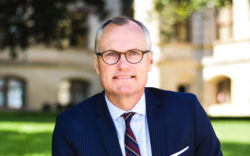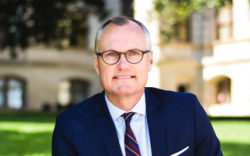If you get sick or badly injured in Georgia, you could find yourself slap out of luck if you live in one of the state’s rural counties.
In places like Clay County, an impoverished rural county in Southwest Georgia, there is no hospital. The county’s only doctor sees patients in a building that used to house a fast-food franchise.
The residents of Clay County are comparatively lucky, however. There are nine rural counties in Georgia that have no physicians, 63 counties that have no pediatric physicians and 79 that have no OB/GYNs. There are 22 counties that have no advanced practice registered nurses, which are nurses who have obtained at least a master’s degree in nursing.
It is a situation that has gotten worse in recent years. Since the beginning of 2013, six rural hospitals in Georgia have shut down.
It’s no coincidence that all of those hospitals closed after Gov. Nathan Deal decided Georgia would not participate in the expansion of Medicaid coverage under the Affordable Care Act. That decision cost the state more than $9 billion in federal funding that might have enabled some of those rural hospitals to keep their doors open.
A legislative study committee has come up with perhaps a partial solution to the problem. The committee, chaired by Sen. Renee Unterman (R-Buford), is recommending that the legislature amend state law so that APRNs can do some of the things that physicians traditionally do, such as prescribe drugs and order imaging tests.
Twenty-two states give APRNs full authority, or “scope of practice,” to do these things. Georgia, on the other hand, is one of the 12 states that place the most restrictions on what APRNs can legally do.
Unterman, who was once a nurse herself, said her committee will draft legislation that would give APRNs a wider scope of practice if they agree to work in counties that are defined as medically underserved—that have few or no physicians, a high percentage of the population that is uninsured and larger-than-normal numbers of low birth-weight babies and cardiovascular deaths.
“The goal is the enticement of APRNs to locate in rural counties,” Unterman said at the committee’s final meeting last week. “We’re facing insurmountable problems and there’s not an easy way to fix it.”
Unterman’s committee is also recommending the expansion of a tax credit program to include physician assistants and APRNs, and a provision that would allow APRNs to bill health insurance providers such as Medicaid. “I think you could quantify this as baby steps,” Unterman said.
Who would oppose the idea of giving Georgians in rural counties more access to health care services? Physicians, to start with. The state’s physicians are represented by a powerful lobbying group, the Medical Association of Georgia. MAG has traditionally opposed any and all attempts to widen the scope of practice of non-physicians. The organization said last week that it “believes that APRNs should continue to work under collaborative practice agreements with physicians to ensure patient safety. MAG also believes that nurses in the state should be governed by the Georgia Composite Medical Board.” In other words, APRNs should be kept under the tight control of physicians so that they don’t threaten their fees and revenue streams.
Unterman said her response to MAG would be: “We’re not encroaching on your turf.” Will her legislative colleagues agree with her and pass her bill? Let’s wait and see.
Like what you just read? Support Flagpole by making a donation today. Every dollar you give helps fund our ongoing mission to provide Athens with quality, independent journalism.










